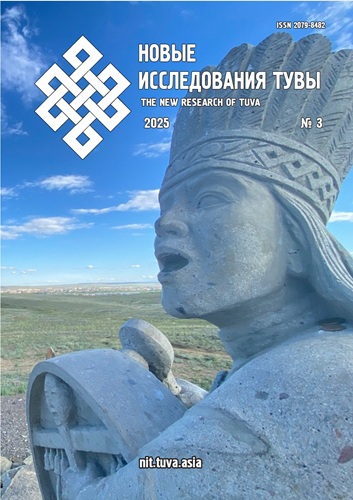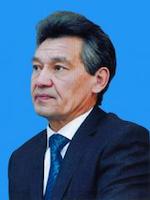Ethnic Characteristics of Employment and Labor Mobility in Contemporary Russian Studies
DOI:
https://doi.org/10.25178/nit.2025.3.29Keywords:
employment; labor mobility; labor migration; ethnicity; ethnic characteristic; ethnoeconomics; Russia; Tuva; Bashkortostan; reviewAbstract
This article presents a review of Russian scientific publications from the past 25 years devoted to the study of ethnic characteristics of employment and labor mobility among the population of Russia.
Based on the overview and analysis of these scientific works, several research groups are identified: the Moscow, Tuvan, and Bashkortostan schools, as well as a number of other research teams and individual authors who are currently actively investigating the ethnic features of employment and labor mobility in Russia.
Particular emphasis is placed on studying the ethnic characteristics of employment and labor mobility in the republics of the Russian Federation, especially in Bashkortostan and Tuva. This focus is due to the unique nature of national republics as historically established territories of the joint residence of various ethnic groups, which makes it possible to more fully reveal the specific features inherent to them in the sphere of employment and labor mobility.
Solving this research problem has also enabled the authors to identify the most relevant and in-demand directions for future studies in this field—such as accounting for the impact of digitalization and informatization factors on employment and labor mobility among different ethnic groups.
References
Abylkalikov, S. I. (2021) Features of demographic development of Tuva: the contribution of migration in the demographic balance. New Research of Tuva, no. 4, pp. 131–142. (In Russ.) DOI: https://doi.org/10.25178/nit.2021.4.10
Abylkalikov, S. I., Baymurzina, G. R. and Batalov, R. O. (2023) Population migration in Tuva according to the 2020 Russian census. New Research of Tuva, no. 2, pp. 6–16. (In Russ.) DOI: https://doi.org/10.25178/nit.2023.2.1
Anaiban, Z. V. (2018) Labour employment and socio-professional orientations of youth in modern Tuva. New Research of Tuva, no. 2, pp. 112–131. (In Russ.) DOI: https://doi.org/10.25178/nit.2018.2.6
Akhmetova, G. F. (2021) Dynamics of labour migration in Bashkortostan. Vestnik Rossiyskogo universiteta druzhby narodov. Seriya: Sotsiologiya, vol. 21, no. 2, pp. 265–278. (In Russ.) DOI: https://doi.org/10.22363/2313-2272-2021-21-2-265-278
Akhmetova, G. F. (2022a) Subjects of the Russian Federation in interregional labour migration: level of participation, causes and factors. DEMIS. Demograficheskie issledovaniya, vol. 2, no. 2, pp. 76–89. (In Russ.) DOI: https://doi.org/10.19181/demis.2022.2.2.6
Akhmetova, G. F. (2022b) Migration processes in national republics with different levels of human potential development (on the example of Bashkortostan, Tatarstan and Tuva). New Research of Tuva, no. 2, pp. 53–69. (In Russ.) DOI: https://doi.org/10.25178/nit.2022.2.4
Achkasov, V. A. (2011) Integration of labour migrants into the host community: the role of the media. Politicheskaya ekspertiza: POLITEX, vol. 7, no. 4, pp. 41–51. (In Russ.)
Baymurzina, G. R., Valiahmetov, R. M. and Bocharov, V. Yu. (2023) Quality of employment of employees and self-employed in Russia. Sotsiologicheskie issledovaniya, no. 4, pp. 153–156. (In Russ.)
Baymurzina, G. R. and Kabashova, E. V. (2022) Employment and incomes of the population of the Republics of Tuva and Bashkortostan (2010–2020). New Research of Tuva, no. 3, pp. 186–207. (In Russ.) DOI: https://doi.org/10.25178/nit.2022.3.13
Baymurzina, G. R., Yagafarova, D. G. and Kabashova, E. V. (2023) Relationship between informal employment and socio-economic development of Russian regions. Ekonomicheskie i sotsial'nye peremeny: fakty, tendentsii, prognoz, vol. 16, no. 6, pp. 223–235. (In Russ.)
Belova, L. G. (2022) Virtual labour migration of highly qualified specialists and the online labour market. Ekonomicheskie sistemy, vol. 15, no. 4 (59), pp. 122–131. (In Russ.) DOI: https://doi.org/10.29030/2309-2076-2022-15-4-122-131
Barkov, F. A. and Serikov, A. V. (2014) Ethno-institutional factors of interethnic relations in the context of migration processes in the Rostov region. Gumanitarii Yuga Rossii, no. 3, pp. 129–140. (In Russ.)
Bakhtigaraeva, A. I., Bryzgalin, V. A., Nikishina, E. N. and Pripuzova, N. A. (2021) Socio-cultural features of the regions of Russia: similarities and differences. Vestnik Moskovskogo universiteta. Seriya 6. Ekonomika, no. 5, pp. 29–51. (In Russ.) DOI: https://doi.org/10.38050/01300105202152
Bugai, N. F. (2013) Problems of employment of Russian Roma in the post-Soviet period. Trudy Instituta rossiyskoy istorii RAN, no. 11, pp. 311–330. (In Russ.)
Busheneva, Yu. I. (2018) Ethnic economy as a special type of economic system: to be or not to be in the modern world. Vestnik Moskovskogo gosudarstvennogo oblastnogo universiteta. Seriya: Ekonomika, no. 2, pp. 8–14. (In Russ.) DOI: https://doi.org/10.18384/2310-6646-2018-2-8-14
Valiahmetov, R. M. (2012) Transformation of the labour market and employment of the population. Teoriya i praktika obshchestvennogo razvitiya, no. 12, pp. 136–140. (In Russ.)
Valiahmetov, R. M., Kadyrov, S. Kh. and Yagafarova, D. G. (2013) Economic and social capital of the Bashkir people. Vestnik Rossiyskogo universiteta druzhby narodov. Seriya: Sotsiologiya, no. 2, pp. 51–63. (In Russ.)
Valiahmetov, R. M. and Baymurzina, G. R. (2017) Employment and socio-professional mobility of youth (on the example of the Republic of Bashkortostan). Rossiya reformiruyushchayasya, no. 15, pp. 134–153. (In Russ.)
Valiahmetov, R. M., Baymurzina, G. R., Turakaev, M. S. and Aitov, S. G. (2018) Labour migration as a factor of human potential in the Republic of Bashkortostan. Ekonomika i upravlenie: nauchno-prakticheskiy zhurnal, no. 6 (144), pp. 147–156. (In Russ.)
Valiahmetov, R. M. and Turakaev, M. S. (2020) Migration potential of the population of the Republic of Bashkortostan: main factors and directions of migration. Nauchny rezultat. Sotsiologiya i upravlenie, vol. 6, no. 4, pp. 69–86. (In Russ.) DOI: https://doi.org/10.18413/2408-9338-2020-6-4-0-5
Valiahmetov, R. M., Baymurzina, G. R., Turakaev, M. S. and Samba, A. D.-B. (2021) Ethnosocial features of employment in the Republics of Tuva and Bashkortostan. New Research of Tuva, no. 4, pp. 206–222. (In Russ.) DOI: https://doi.org/10.25178/nit.2021.4.15
Valiahmetov, R. M. and Turakaev, M. S. (2024) Family status and ethnicity as factors of migration and labour mobility (on the example of the Republic of Bashkortostan). Nauchny rezultat. Sotsiologiya i upravlenie, vol. 10, no. 4, pp. 111–129. (In Russ.) DOI: https://doi.org/10.18413/2408-9338-2024-10-4-0-6
Varshaver, E. A. and Rocheva, A. L. (2014) Communities in cafes as an environment for the integration of ethnic migrants in Moscow. Monitoring obshchestvennogo mneniya: ekonomicheskie i sotsial'nye peremeny, no. 3 (121), pp. 104–114. (In Russ.) DOI: https://doi.org/10.14515/monitoring.2014.3.06
Galin, R. A. and Galina, L. L. (2014) Labour resources of Bashkortostan in the light of migration processes. Vestnik VEGU, no. 1 (69), pp. 19–25. (In Russ.)
Galin, R. A., Galina, L. L. and Akmadieva, T. R. (2009) Transformation of migration processes in Russia and in the Republic of Bashkortostan. Vestnik VEGU, no. 2 (40), pp. 55–64. (In Russ.)
Golenkova, Z. T., Goliusova, Yu. V. and Samba, A. D.-B. (2021) Transformation of the regional socio-professional space (on the example of the Republic of Tuva). Sotsiologicheskaya nauka i sotsialnaya praktika, vol. 9, no. 3 (35), pp. 167–183. (In Russ.) DOI: https://doi.org/10.19181/snsp.2021.9.3.8440
Gurova, I. M. (2021) Remote work as a trend of the time: results of mass experience. MIR (Modernizatsiya. Innovatsii. Razvitie), vol. 11, no. 2, pp. 128–147. (In Russ.)
DOI: https://doi.org/10.18184/2079-4665.2020.11.2.128-147
Drobizheva, L. M. (2016) Variations in the adaptive potential of the population to growing ethnic diversity. Rossiya reformiruyushchayasya, no. 14, pp. 379–394. (In Russ.)
Zhade, Z. A., Shadzhe, A. Yu. and Ilyinova, N. A. (2016) Expert community about ethno-social processes and causes of interethnic tension in southern Russia. Teoriya i praktika obshchestvennogo razvitiya, no. 7, pp. 9–15. (In Russ.)
Igosheva, M. A. (2020) Ethnic entrepreneurship in the context of modern migration processes: the experience of the Chinese diaspora in Russia. Manuskript, vol. 13, no. 9, pp. 104–109. (In Russ.) DOI: https://doi.org/10.30853/manuscript.2020.9.20
Isengalieva, M. E. (2014) Factors influencing the migration of labour resources in the Republic of Kazakhstan. Teoriya i praktika obshchestvennogo razvitiya, no. 4, pp. 217–220. (In Russ.)
Kylgyday, A. Ch. (2020) The role of traditional employment of Tuvans in solving the problems of the regional labour market: new approaches. Ekonomika. Professiya. Biznes, no. 1, pp. 65–70. (In Russ.) DOI: https://doi.org/10.14258/epb201960
Between Home... and Home. Return Spatial Mobility of the Population of Russia (2016) / K. V. Averkieva et al.; ed. T. G. Nefedova, K. V. Averkieva, A. G. Makhrova. Moscow, Novy Khronograf. 504 p. (In Russ.)
Mobility and Stability in the Russian Labour Market (2017) / N. T. Vishnevskaya et al.; ed. V. E. Gimpelson, R. I. Kapelyushnikov. Moscow, HSE Publishing House. 529 p. (In Russ.)
Mukomel, V. I. (2015) Our “others”: domestic ethnic migrants in the Moscow metropolis. Federalizm, no. 1 (77), pp. 79–92. (In Russ.)
Mukomel, V. I. (2016) Problems of integration of domestic ethnic migrants. Sotsiologicheskie issledovaniya, no. 5 (385), pp. 69–79. (In Russ.)
Mukomel, V. I. (2017) Migrants in the Russian labour market: employment, mobility, intensity and labour remuneration. Statistika i Ekonomika, no. 6, pp. 69–79. (In Russ.) DOI: https://doi.org/10.21686/2500-3925-2017-6-69-79
Nazarchuk, A. V. (2012) Multiculturalism in the network society. Monitoring obshchestvennogo mneniya: ekonomicheskie i sotsialnye peremeny, no. 1 (107), pp. 108–112. (In Russ.)
Novikova, E. Yu. (2011) Ethnic consciousness in the economy of Russia. Vestnik Rossiyskoy ekonomicheskoy akademii im. G. V. Plekhanova, no. 2 (38), pp. 28–34. (In Russ.)
Ovchinnikov, V. N. and Ketova, N. P. (2016) Ethno-cultural component of consumer behaviour of the population of the North Caucasus. Vestnik Adygei State University. Seriya 5. Ekonomika, no. 2(180), pp. 25–34. (In Russ.)
Perova, E. Yu. (2016) Ethnic economy as a direction for improving the efficiency of the use of social resources of the region. Izvestiya Baikal'skogo gosudarstvennogo universiteta, vol. 26, no. 5, pp. 705–712. (In Russ.) DOI: https://doi.org/10.17150/2500-2759.2016.26(5).705-712
Pechura, O. V. (2009) Ethnic factor in the economic development of the region. Izvestiya UrGEU, no. 2, pp. 138–143. (In Russ.)
Popkov, Yu. V. and Tyugashev, E. A. (2020) Tuva in the dialogue of cultures: a comparative context. New Research of Tuva, no. 4, pp. 217–229. (In Russ.) DOI: https://doi.org/10.25178/nit.2020.4.15
Rozhkova, L. V. (2009) Entrepreneurship as a means of social adaptation of ethnic migrants. Izvestiya vysshikh uchebnykh zavedeniy. Povolzhskiy region. Gumanitarnye nauki, no. 2 (10), pp. 131–141. (In Russ.)
Ryazantsev, S. V. (2018) Labour immigration in Russia: myths and counterarguments. Vestnik Rossiyskogo universiteta druzhby narodov. Seriya: Ekonomika, vol. 26, no. 4, pp. 718–729. (In Russ.) DOI: https://doi.org/10.22363/2313-2329-2018-26-4-718-729
Ryazantsev, S. V., Ledeneva, V. Yu. and Mishchuk, S. N. (2023) The impact of migration on the transformation of the ethnic composition of the population of Russia: trends and approaches to migrant adaptation policy. Zhurnal Sibirskiy federal'nyy universitet. Seriya: Gumanitarnye nauki, vol. 16, no. 1, pp. 104–116. (In Russ.)
Ryazantsev, S. V. and Sydigalieva, B. A. (2024) New trends in migration from Kyrgyzstan to the Russian Federation. DEMIS. Demograficheskie issledovaniya, vol. 4, no. 3, pp. 105–118. (In Russ.) DOI: https://doi.org/10.19181/demis.2024.4.3.7
Savoskul, M. S. (2011) Strategies of adaptation of ethnic migrants in local communities. Monitoring obshchestvennogo mneniya: ekonomicheskie i sotsialnye peremeny, no. 5 (105), pp. 103–112. (In Russ.)
Samba, A. D.-B. (2022) Retrospective analysis of the formation of the socio-professional structure of the population of the Republic of Tuva. New Research of Tuva, no. 3, pp. 135–149. (In Russ.) DOI: https://doi.org/10.25178/nit.2022.3.10
Sevek, V. K., Sereežikpey, A. A. and Kuular, Sh. V. (2024) Labour market and employment trend in Russia and the Republic of Tuva. Nauchnye trudy Volnogo ekonomicheskogo obshchestva Rossii, vol. 249, pp. 399–420. (In Russ.) DOI: https://doi.org/10.38197/2072-2060-2024-249-5-399-420
Sizova, I. L. and Khusyaiov, T. M. (2017) Labour and employment in the digital economy: problems of the Russian labour market. Vestnik Sankt-Peterburgskogo universiteta. Sotsiologiya, vol. 10, no. 4, pp. 376–396. (In Russ.) DOI: https://doi.org/10.21638/11701/spbu12.2017.401
Simonov, S. G., Khamatkhanova, M. A., Lysenko, I. V. and Safonov, D. A. (2016) Diaspora business: essence, formation and security of development in the region. Tyumen, Tyumen Industrial University. 160 p. (In Russ.)
Social Inequality of Ethnic Groups: Views and Reality (2002) / ed. L. M. Drobizheva. Moscow, Academia. 480 p. (In Russ.)
Tagarov, B. Zh. (2019) The impact of the digital economy on employment in conditions of economic inequality between territories. Izvestiya Baikal'skogo gosudarstvennogo universiteta, vol. 29, no. 3, pp. 388–395. (In Russ.) DOI: https://doi.org/10.17150/2500-2759.2019.29(3).388-395
Turakaev, M. S. (2016) Rotational employment and reproduction of socio-cultural practices in the Russian region: the example of the Republic of Bashkortostan. Vestnik Sankt-Peterburgskogo universiteta. Sotsiologiya, no. 1, pp. 35–47. (In Russ.) DOI: https://doi.org/10.21638/11701/spbu12.2016.10435
Turakaev, M. S. (2019) Educational level and cultural capital as factors of population migration (the example of residents of the Republic of Bashkortostan). Sotsiologicheskaya nauka i sotsialnaya praktika, vol. 7, no. 4 (28), pp. 119–127. (In Russ.) DOI: https://doi.org/10.19181/snsp.2019.7.4.6805
Turakaev, M. S. (2021) Temporary labour migration in Russia: current issues and sociological research. Zhurnal sotsiologii i sotsialnoy antropologii, vol. 24, no. 4, pp. 34–58. (In Russ.) DOI: https://doi.org/10.31119/jssa.2021.24.4.2
Turakaev, M. S. and Baymurzina, G. R. (2022) Shift work through the eyes of temporary labour migrants from Bashkortostan. Problemy razvitiya territorii, vol. 26, no. 6, pp. 115–133. (In Russ.) DOI: https://doi.org/10.15838/ptd.2022.6.122.7
Endryushko, A. A. (2022) Russians’ perceptions of the influence of ethnicity on social advancement (on the example of the labour sphere). Vestnik Instituta sotsiologii, vol. 13, no. 3, pp. 32–48. (In Russ.) DOI: https://doi.org/10.19181/vis.2022.13.3.829
Ethnodemographic Processes and Migration in the Regions of Asian Russia: Current Situation, Forecasts and Risks (2021) / ed. by T. B. Smirnova. Omsk, Izdatelsky tsentr KAN. 272 p. (In Russ.)
Bing, L. (2011) The Study of Labor Mobility and its Impact on Regional Economic Growth. Procedia Environmental Sciences, vol. 10, part A, pp. 922–928. DOI: https://doi.org/0.1016/j.proenv.2011.09.148
Meng, F., Liu, Z., Lin, H. and Bhuiyan, M. A. (2023) The impact of labor mobility with fellow townsmen on the wages of rural migrants: evidence from China. Humanities and Social Sciences Communications, vol. 10, article 376. DOI: https://doi.org/10.1057/s41599-023-01795-8
Turakayev, M. S. (2022) Job change in the conditions of precarious work (on the example of the Republic of Bashkortostan permanent residents). Population and Economics, vol. 6, no. 3, pp. 15–34. DOI: https://doi.org/10.3897/popecon.6.e78162
Published
How to Cite
For citation:
Valiakhmetov R. M. and Belyakov N. S. Ethnic Characteristics of Employment and Labor Mobility in Contemporary Russian Studies. New Research of Tuva, 2025, no. 3, pp. 469-485. DOI: https://doi.org/10.25178/nit.2025.3.29
Issue
Section

This work is licensed under a Creative Commons Attribution-NonCommercial 4.0 International License.

Author(s) license holder(s) grant rights for their work to the journal (grantee of a license) under the simple non-exclusive open license in accordance with Art. 1286.1 «Open license for a research work, work of literature or fine arts», Civil Code of the Russian Federation.
New Research of Tuva publishes articles under the Creative Commons Attribution-NonCommercial license (CC BY-NC).
Since it is an open license, author(s) reserve the right to upload the article to their institutional repository, submit it to another journal (if it allows republications), or republish it on their own website (in full, or in part).
However, several conditions apply here:
a) The republished version must always contain the name(s) and affiliation(s) of the author(s), the original title and the hyperlink to the original version on the New Research of Tuva website;
b) It must be in open access, free of charge, and no category of readers must be in any way whatsoever advantaged over general readership.
c) should the contribution be submitted elsewhere by its author(s) without substantial modification (30% or more of original text unchanged), the body of the article should contain a disclaimer that the original version was published in New Research of Tuva (with a link to the respective page)
The CC-BY-NC is a non-revocable license which applies worldwide and lasts for the duration of the work’s copyright.










